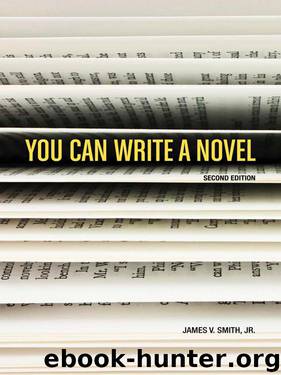You Can Write a Novel by James V. Smith Jr

Author:James V. Smith Jr. [Smith, James V. Jr.]
Language: eng
Format: epub, mobi
Tags: ebook
Publisher: F+W Media, Inc.
Published: 2012-05-09T04:00:00+00:00
* * *
I have a list I call Ten Bumper Stickers That Cry Out “I’m an Amateur.” The list is a compilation of mistakes (not including misspellings and typos) of content and structural errors many beginning writers make. Avoid them and you’ll have a step up on all the first-time novelists who don’t have this book to coach them along. Paraphrasing Jeff Foxworthy’s popular comedy routine, here goes.
You might be an amateur if …
1. YOU WRITE ENDLESS SYNONYMS FOR SAID. Perhaps you’ve seen (or written) lines of dialogue such as these:
“You’re an animal,” she said.
“Am not,” he replied.
“Are too,” she countered.
“Oh yeah?” he challenged.
“Yes. A pig,” she added.
“Am not,” he sneered.
“Are too,” she continued.
“A pig?” he grinned. “Really?”
“A fat pig,” she emphasized.
When you examine any best-seller, I’ll wager you never find such instances of dialogue, even in a badly written best-seller. The pro does not write like that. She understands that said is an invisible word. If the context does not tell a reader who is speaking, and especially when three or more characters engage in dialogue, said does the job without becoming intrusive.
Having said that, let’s break the rule. You surely sense by now how little respect I have for rules. It’s true, even for my own. So I wrote these lines to amuse myself:
“Damn you,” she prayed.
“I’m going to vomit,” she spewed.
“Thomas Edison,” he invented.
“Can’t you see the tears in my eyes?” she cried.
“Such a ghastly, ghostly moon,” he waxed.
“Whopper,” she ordered, “on the double, and don’t you dare put onions on it.”
“Stop and think,” she blurted.
“I think I am,” she philosophized.
“Oh, and two plus two equals five,” she added.
“From this moment, I dedicate myself to total silence,” she vowed. “And poverty. Oh, and chastity.”
“I never interrupt,” she interjected.
“Ding-dong,” she chimed.
“I dot a code,” she sniffed.
“I hear he’s a thief and a liar,” she slurred.
I hope you’ll be amused, too, and perhaps invent some of your own and send them along so I can post them on my Website. You know, participate. But, as a rule, avoid this blunder and the next one in your quotable exchanges.
2. YOUR CHARACTERS SNEER, GRIN, AND LAUGH THEIR WORDS. Avoid constructions that appear in the previous sample dialogue. It makes no more sense to write “ ‘Am not,’ he jogged,” than to write “he sneered.” If you must indulge in a sneer, write a separate sentence, something like:
“Am not.” He sneered at her, inviting a comeback as witty as his own.
3. YOU USE COUNTLESS -LY WORDS. Usually called adverbs, these words rarely carry a story line authoritatively. The amateur author severely taxes her brain, striving earnestly to write professionally, only to find herself crying softly, “One rejection after another.” Avoid -ly constructions by finding a precise verb that expresses your meaning. Instead of crying softly, write whimpering. Try eliminating the -ly word altogether. In this very paragraph you could strengthen the material by deleting severely, earnestly, and softly, although usually, rarely, and professionally would have to stay to pinpoint the meaning I intended.
Download
This site does not store any files on its server. We only index and link to content provided by other sites. Please contact the content providers to delete copyright contents if any and email us, we'll remove relevant links or contents immediately.
Asking the Right Questions: A Guide to Critical Thinking by M. Neil Browne & Stuart M. Keeley(5747)
Autoboyography by Christina Lauren(5221)
Eat That Frog! by Brian Tracy(4508)
Dialogue by Robert McKee(4379)
Sticky Fingers by Joe Hagan(4179)
Journeys Out of the Body by Robert Monroe(3607)
Annapurna by Maurice Herzog(3459)
Full Circle by Michael Palin(3435)
Schaum's Quick Guide to Writing Great Short Stories by Margaret Lucke(3368)
Elements of Style 2017 by Richard De A'Morelli(3336)
The Art of Dramatic Writing: Its Basis in the Creative Interpretation of Human Motives by Egri Lajos(3055)
Atlas Obscura by Joshua Foer(2943)
Why I Write by George Orwell(2941)
The Diviners by Libba Bray(2924)
The Fight by Norman Mailer(2920)
In Patagonia by Bruce Chatwin(2915)
The Mental Game of Writing: How to Overcome Obstacles, Stay Creative and Productive, and Free Your Mind for Success by James Scott Bell(2893)
Venice by Jan Morris(2561)
The Elements of Style by William Strunk and E. B. White(2463)
